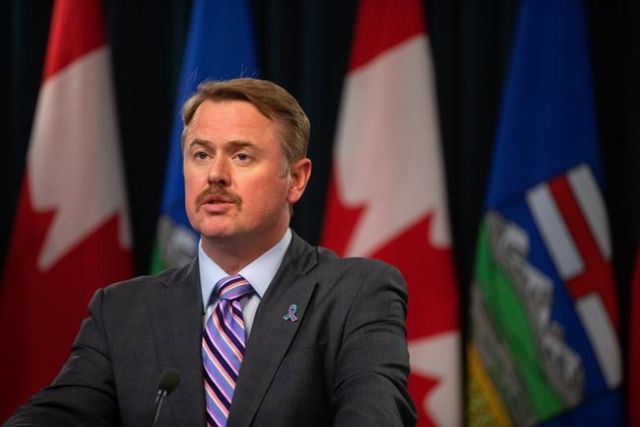
Alberta’s government house leader is accusing federal officials of trespassing on private property, but the provincial Justice Department said there’s no evidence of that occurring.
“We are seeing federal employees trespass onto private land in Alberta and, as a result of that, we don’t think that that’s appropriate,” Joseph Schow told reporters Wednesday.
Schow outlined a bill coming in the spring legislature sitting to stop the perceived illegality.
“We are making that an offence in this province, especially for the water testing.
“Should federal employees decide to trespass on private land, they will be charged.”
Schow directed reporters to Justice Minister Tyler Shandro’s office for details on which federal workers were illegally entering private land and for what purpose.
Shandro’s spokesman, Ethan Lecavalier-Kidney, responded in a written statement: “There have been no confirmed cases of trespass by federal government employees in Alberta.”
But Lecavalier-Kidney added: “Concerns were raised by landowners following events that transpired in Saskatchewan in 2022 when a property owner identified trespassing occurring without permission.”
Last summer, the Saskatchewan government complained to Ottawa when a landowner accused federal inspectors of taking water samples from a dugout on private land without consent.
Saskatchewan then amended its laws to include federal workers as among those who cannot trespass.
Lecavalier-Kidney said Alberta is looking at a similar change.
“A review determined that the Petty Trespass Act and Trespass to Premises Act, which already applies to individuals and corporations, could be further strengthened by extending the act to apply to the federal government,” he wrote.
Environmental and tort law professor Martin Olszynski said while he waits to see the details of Alberta’s bill, it appears both provinces are indulging in political window dressing.
Under the Canada Water Act, inspectors have the power to walk onto private land to conduct tests subject to restrictions, such as not entering someone’s house.
Olszysnki, with the University of Calgary, said the changes by Alberta and Saskatchewan wouldn’t change the primacy of the federal legislation as long as the inspectors are executing their lawful duties under the act.
“Permission is not required,” said Olszynski.
“The failure to obtain permission does not mean someone is trespassing, particularly if they have lawful authority.”
Olszynski also said incendiary language, such as saying people are trespassing when they are simply acting within their legal authority, can be harmful.
“You have to be careful when you’re making those kinds of accusations,” he said.
“We have seen landowners take matters into their own hands.
“People might get hurt.”
Schow said Premier Danielle Smith’s government will also introduce a bill in the upcoming sitting to shield gun owners from the federal firearms buyback amnesty program.
He did not provide details, but said: “A number of firearms owners in this province have reached out to me and a number of my colleagues and feel that the federal legislation is an overreach.”
The federal government has prohibited more than 1,500 different models of assault-style firearms. There is a buyback program, and an amnesty is in place until October.
Shandro urged the Alberta RCMP last fall to not enforce the program, saying taking the weapons is not a provincial priority. He also said the province would not help Ottawa enforce it.
NDP Leader Rachel Notley said the bills are pointless political distractions.
“We haven’t seen the bill, so we don’t know exactly what solution this is seeking a problem,” Notley told reporters in Calgary.
“It seems to be part of a longer pattern to distract Albertans from key priorities that really matter to them and to pick fights with Ottawa.”
The spring sitting is expected to last only a month, during which the government will also pass the budget that was introduced Tuesday.
A provincial election in scheduled for May 29.
